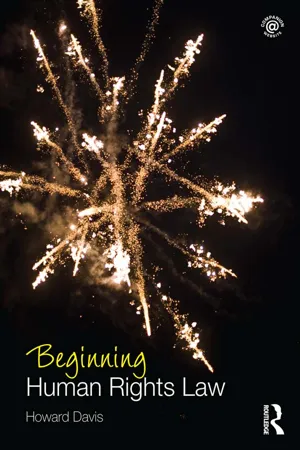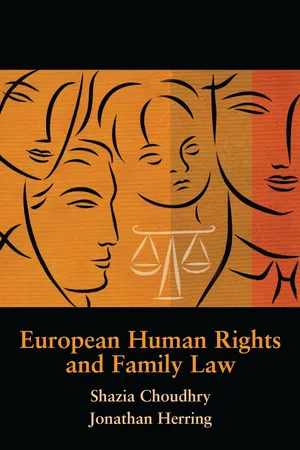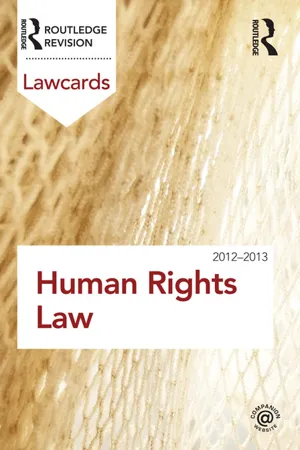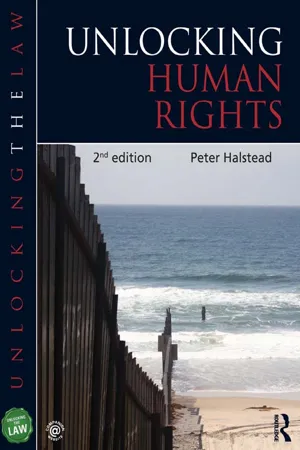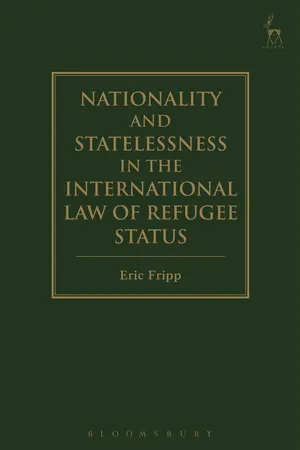Law
Article 8 echr
Article 8 of the European Convention on Human Rights (ECHR) protects the right to respect for private and family life, home, and correspondence. It encompasses a wide range of personal and family relationships, as well as the right to privacy and protection from arbitrary interference by public authorities. This article is a fundamental component of human rights law, ensuring individuals' privacy and family life are safeguarded.
Written by Perlego with AI-assistance
Related key terms
9 Key excerpts on "Article 8 echr"
- eBook - ePub
- Howard Davis(Author)
- 2014(Publication Date)
- Routledge(Publisher)
Chapter 8Rights to privacy and propertyLEARNING OBJECTIVES
On completing this chapter the reader should understand:• The impact of Article 8 in providing a legal basis for challenges to interferences with private and family life, home and correspondence• The structure of Article 8 as a ‘qualified right’• The protection of the right to peaceful enjoyment of possessions guaranteed by Article 1 of the First Protocol• The context of both of these Convention rights in respect of broader ideas about privacy and property.INTRODUCTION
Being a ‘person’, a full human being, implies that there should be areas of life that remain under that person’s sole control and subject solely to his or her choices. There should be areas of life that are not to be controlled or interfered with by others — such as police or civil servants acting under the general law or an employer acting on the basis of a contract of employment. This is, perhaps, the basic idea of ‘privacy’. The European Court of Human Rights (ECtHR) sometimes refers to ‘an “inner circle” in which the individual may live his own personal life as he chooses’ (Niemietz v Germany (1993) 16 EHRR 97). As we shall see, however, the various rights grouped together in Article 8 (respect for private and family life, home and correspondence) include, but go well beyond, this limited idea of privacy. It moves in the direction of being a right to live your life as you please subject to the reasonable restraints of others — where, obviously, attention is then focused on the nature of those reasonable restraints and who decides their impact.ENGLISH LAW
The common law of England and Wales has not developed a legally enforceable concept of privacy in itself. However, important aspects of private life are protected by law in a variety of ways. For example: - eBook - ePub
Human Rights and Private Law
Privacy as Autonomy
- Katja S Ziegler(Author)
- 2007(Publication Date)
- Hart Publishing(Publisher)
Part II
Restraints on Privacy by Private Parties: Specific Issue Areas
Passage contains an image
Part II.A
Contract Law
Passage contains an image
9
Privacy of Contract
HENRICUS J SNIJDERS I. INTRODUCTIONTHIS CHAPTER FOCUSES on the fundamental right to privacy of Article 8 echr and its significance for contracts. In fact, Article 8(1) ECHR constitutes an umbrella for four rights, which are all dealt with in this provision: the right to respect for one’s private life, family life, home and correspondence. The same applies more or less to Article II-67 of the Treaty establishing a Constitution for Europe, which recognises ‘the right to respect for his or her private and family life, home and communications’. This article will not be dealt with here separately.A substantial – at least indirect – horizontal effect of the provisions of Article 8 echr between private (natural or legal) persons will be assumed in this contribution, an assumption which is in conformity with the views in ECHR countries.1II. SCOPE OF THE RIGHT TO PRIVACY OF Article 8 echr The European Court of Human Rights never gave a definition of the fundamental right to privacy. Usually it refers to one or more of the aforementioned four specific rights of Article 8.The Consultative (Parliamentary) Assembly of the Council of Europe, in its Declaration on mass communication media and human rights in 1970,2 gave the following definition, which was repeated by this Assembly in its Declaration on the right to privacy in 19983 (on the occasion of the fatal accident of Diana, Princess of Wales):The right to privacy consists essentially in the right to live one’s own life with a minimum of interference.This definition gives an indication that the fundamental right to privacy may be distinguished in still another way: it does not only include the right to intimacy (‘the right to be left alone’)4 but also the right to personal autonomy (the right to self-determination). These rights will be referred to as ‘components’ contrary to the four ‘rights’ explicitly mentioned in Article 8. Another component, the right to enter into relations with other human beings, which has been mentioned by authors,5 - eBook - ePub
- Shazia Choudhry, Jonathan Herring(Authors)
- 2010(Publication Date)
- Bloomsbury Publishing(Publisher)
1 The European Convention on Human Rights and Family LawThe impact of the European Convention on Human Rights (ECHR) on family law has undoubtedly been significant. The most relevant article is, of course, Article 8, which directly protects the right to family life and the impact of this Article can most obviously be seen in the law relating to disputes concerning children both in terms of legal process and decision making. However, as we shall see throughout this study, a number of other articles, in addition to Article 8, have had a significant effect in other areas of family law, including, for example, the development of the law relating to corporal punishment, the recognition of transgender rights and the rights of prisoners to access fertility treatments in order to create a family. A detailed analysis of these articles will take place as and when relevant throughout the following chapters. However, it is necessary to outline the basic structure of the main articles that have had the most impact upon family law in order to fully understand how certain principles and concepts employed by the European Court of Human Rights (ECtHR), such as proportionality and the margin of appreciation, which will also be examined in detail in this chapter, affect their operation.An Introduction to the General Structure of the Convention Articles
Not all the Convention rights are formulated in the same way. There are two types of Convention rights: unqualified rights, some of which are ‘non-derogable’, and qualified rights. Of those rights that are most relevant to family law the following fall within the unqualified category: the right to life (Article 2); the right to protection from torture, inhuman and degrading treatment and punishment (Article 3), the right to liberty and security (Article 5), the right to a fair trial (Article 6), the right to marry (Article 12), the right to an effective remedy (Article 13) and the prohibition of discrimination in Article 14. Qualified rights that are most relevant to family law include the right to respect for private and family life (Article 8), religion and belief (Article 9), freedom of expression (Article 10), the right to peaceful enjoyment of property (Protocol 1, Article 1) and to some extent the right to education (Protocol 1, Article 2). The main articles of relevance to this chapter will be set out in brief. - Carla M. Buckley, Krešimir Kamber, Pamela McCormick, David J. Harris(Authors)
- 2022(Publication Date)
- Council of Europe(Publisher)
The reach of Article 8 is now extremely broad. In interpreting the Convention as a living instrument, the Court has found that Article 8, and in particular the concept of “private life”, applies to a wide range of situations, many of which could not have been foreseen by the original drafters. It has also extended the scope of the right beyond the substantive by developing the concepts of positive, procedural and even investigatory obligations. However, while the Court has, on the one hand, significantly broadened the scope of Article 8, at the same time it has increasingly relied on the interlinked concepts of “subsidiarity” and “the margin of appreciation” in order to find that the Article has not been breached. Therefore, while it may have become more willing to accept that Article 8 is engaged, where the domestic courts have themselves applied the relevant human rights standards consistently with the Convention and the Court’s case law, it has become increasingly reluctant to interfere with their decisions. In this way, the Court is both encouraging national legislatures and judiciaries to themselves apply the Convention and signalling its intention to focus its own judicial resources on those cases where there has been a failure in the protection afforded at the national level.FURTHER READINGCollinson J. (2020), “Reconstructing the European Court of Human Rights’Article 8 Jurisprudence in Deportation Cases: The Family’s Right and the Public Interest”, 20 (2) Human Rights Law Review 333, DOI: https://doi.org/10.1093/hrlr/ngaa015 .Desmond A. (2018), “The Private Life of Family Matters: Curtailing Human Rights Protection for Migrants under Article 8 of the ECHR?”, 29 (1) European Journal of International Law 261, DOI: https://doi.org/10.1093/ejil/chy008 .Fenton-Glynn C. (2020), Children and the European Court of Human Rights, Oxford University Press, Oxford, DOI: 10.1093/oso/9780198787518.001.0001 .Gonzalez-Salzberg D. (2019), Sexuality and Transsexuality under the European Convention on Human Rights: AQueer Reading of Human Rights Law, Hart Publishing, Oxford.Greer S. (2000),The Margin of Appreciation: Interpretation and Discretion Under theEuropean Convention on Human Rights, Human Rights Files No. 17, Council of Europe.HELP Online course on Article 8 European Convention on Human Rights – Right to Respect for Private and Family Life, available at https://www.coe.int/en/web/help/courses , accessed 12 April 2022.Kratochvíl J. (2011), “The Inflation of the Margin of Appreciation by the European Court of Human Rights”, 29 (3) Netherlands Quarterly of Human Rights 324, DOI: 10.1177/016934411102900304 .Lubin, A. (2022), “Big Brother Watch v. UK (Eur. Ct. H.R. Grand Chamber)”, International Legal Materials, 1, DOI: https://doi.org/10.1017/ilm.2022.2- eBook - ePub
The EU Charter of Fundamental Rights
A Commentary
- Steve Peers, Tamara Hervey, Jeff Kenner, Angela Ward, Steve Peers, Tamara Hervey, Jeff Kenner, Angela Ward(Authors)
- 2021(Publication Date)
- Hart/Beck(Publisher)
13907.54A In his thorough examination of the fundamental rights aspects of the question of interpretation of Directive 2004/38, the Advocate General further mentioned the ECtHR’s rulings that Article 8 echr does not guarantee foreign nationals ‘a right to choose the most suitable place to develop family life’, and does not impose on a state ‘a general obligation to respect immigrants’ choice of the country of their matrimonial residence and to authorise family reunion in its territory’.140 Nevertheless, the ECtHR has held that Article 8 echr may give rise to positive obligations inherent in effective respect for family life, meaning that a state is required to let a person enter its territory.141 On the basis of this interpretation, the CJEU has held that, while the ECHR does not guarantee the right of a foreign national to enter or to reside in a particular state, refusing to allow a person to enter or reside in a state where close members of his family are living may amount to an infringement of the right to respect for family life as guaranteed by Article 8(1) of the ECHR. Such an interference will, the Advocate General pointed out, infringe the ECHR if it does not meet the requirements of Article 8(2) according to which it must be in accordance with the law, motivated by one or more of the legitimate aims under that paragraph, and proportionate to the legitimate aim pursued.14207.55A The combination of the right of residence attached to Union citizenship and the protection of private and family life, as implemented by EU law, may therefore effectively establish a right of residence for members of the family of the Union citizen. In the Advocate General’s opinion, this right need not be reserved for the closest family members. Whilst Article 8 echr guarantees only the exercise of the right to respect for an ‘existing’ family life, and whilst it has been held, in the specific area of entry, residence and removal of non-nationals, that the family had to be limited to the ‘core family’, the ECtHR nevertheless generally adopts a broad conception of family life, characterised by the presence of legal or factual elements pointing to the existence of a close personal relationship, which makes it possible to include, under certain circumstances, ties between grandparents and grandchildren or ties between brothers and sisters. Even de facto relationships lacking any blood ties have been regarded as constituting ‘family life’.143 Assuming that the principle of non-discrimination does not allow a family definition with ‘variable geometry’ depending on whether the members of the family of the Union citizen concerned are themselves Union citizens or nationals of a non-Member State, and that, when defining the scope of the fundamental right to private and family life, the notion of family also cannot vary according to the more or less strict definitions under the provisions of secondary law, the Advocate General concluded that the fundamental right to private and family life may, in principle, be relied on by all categories of persons mentioned in Article 3(2) of Directive 2004/38.144 - eBook - ePub
- Routledge(Author)
- 2013(Publication Date)
- Routledge(Publisher)
War Crimes Act 1991 in the UK.Article 8 - Right to respect for private and family life
1 Everyone has the right to respect for his private and family life, his home and his correspondence.2 There shall be no interference by a public authority with the exercise of this right except such as is in accordance with the law and is necessary in a democratic society in the interests of national security, public safety or the economic well-being of the country, for the prevention of disorder or crime, for the protection of health or morals, or for the protection of the rights and freedoms of others.As the article states, the areas covered are private and family life, home and correspondence. These areas tend to overlap and the use of’private’ life encompasses a broad definition. Two main areas arise: protection from arbitrary interference by the State and respect for an individual’s private life and relationships. It is a qualified right, with which the State may only interfere in the pursuit of legitimate aims ‘necessary in a democratic society’ as listed in para (2). In addition to refraining from interfering, the State may also have positive obligations to ensure that Art 8 rights are respected. - eBook - ePub
- Peter Halstead(Author)
- 2014(Publication Date)
- Routledge(Publisher)
Important though it is, it must be borne in mind that this right does not sit alongside the prohibitions on torture and slavery as being absolute and unconditional. Public authorities can, in accordance with the law and where necessary in a democratic society, justifiably interfere with the exercise of the right to respect for these things in six circumstances, in the interests of:national security;public safety;economic well-being of the country;prevention of disorder or crime;protection of health or morals;protection of the rights and freedoms of others.ACTIVITYSelf-test questions1. How well do you think this approach helps you to understand the meaning and extent of Article 8 as compared to a discussion of the six circumstances listed above? 2. Which of the cases in this analysis do you think provides the most helpful basis on which to understand how Article 8 protections works, and why? 3. Write down what you understand to be the main differences between private life and family life, using a case for each of them to support your summary.9.7 Marriage and founding a familyThe right to marry and found a family contained in Article 12, although expressed separately from the rights to respect encompassed in Article 8, goes hand in glove with the rules established for equality of private rights and responsibilities between spouses and towards children in the Seventh Protocol.ARTICLE‘Men and women of marriageable age have the right to marry and found a family, according to the national laws governing the exercise of this right.’PROTOCOL 7 ARTICLE 5‘Spouses shall enjoy equality of rights and responsibilities of a private law character between them, and in their relations with their children, as to marriage, during marriage and in the event of dissolution. This Article shall not prevent States from taking such measures as are necessary in the interests of children.’Article 12 has various cultural connotations as well as providing a specific human right to marry and found a family, which is why it is couched in terms that refer to the national laws governing its exercise. Clues as to other issues implicit in this right are indicated by the terms of Article 7 of the Protocol because it is not simply the participants’ ages and qualifications needed to marry in the first place that are important. - Eric Fripp(Author)
- 2016(Publication Date)
- Hart Publishing(Publisher)
The applicant claimed that he had been discriminated against contrary to Article 14 taken with Article 8 echr50. The ECtHR rejected the applicant’s claim that the denial of citizenship had interfered with his family life with his father resident in Malta given the father’s lack of interest in a relationship with his son. It found, however, an interference with the applicant’s private life based on the denial of citizenship ruling that ‘its impact on the applicant’s social identity was such as to bring it within’ Article 8 echr50 (at [33]). The applicant had been treated differently on the basis that he had been born out of wedlock and the ECtHR held that no reasonable or objective grounds had been adduced for this (at [45]–[49]). 68 ii. Fourth Protocol to the European Convention on Human Rights and Fundamental Freedoms 1950 6.99 Protocol 4 to ECHR50 entered into force on 2 May 1968. Whilst becoming a State Party is not mandatory for Council of Europe Member States, it had 43 States Parties as at 1 January 2016 including every Member State of the Council of Europe save Greece, Switzerland, Turkey and the United Kingdom (Turkey and the United Kingdom have signed but not ratified it). Article 3 of the Protocol provides as follows: Article 3: Prohibition of expulsion of nationals 1. No one shall be expelled, by means either of an individual or of a collective measure, from the territory of the State of which he is a national. 2. No one shall be deprived of the right to enter the territory of the state of which he is a national. 6.100 Article 3 of Protocol 4 provides an absolute prohibition on the expulsion of nationals. The question of whether an applicant is a national is ‘determined, in principle, by reference to national law’: Slivenko v Latvia [GC] No 48321/99 (admissibility decision, 23 January 2002) [77]- Helen Fenwick, Gavin Phillipson, Alexander Williams(Authors)
- 2020(Publication Date)
- Routledge(Publisher)
148 The applicants were prosecuted in 1998 on the basis of a video which showed them engaging in consensual group sex. They were convicted of gross indecency. One of the men, Williams, and another, Connell, admitted to having had sex with one of the other five who was, at the time, six months under the then age of consent, 18. Williams was convicted of buggery, although his suspended sentence was later revoked by the Court of Appeal. At the time of the convictions, the court was warned that the prosecutions breached Article 8. Five of the men applied to the European Court of Human Rights and, in July 2001, in order to avoid defeat in the Court, the Government offered each of them compensation in an out of court settlement. The Sexual Offence Act 2003 brought about equalisation of the position. By these incremental steps, legal acceptance of the sexual autonomy of homosexuals was brought about, in the sense of achieving equality with heterosexuals.16. Sexual identity. Article 8 recognises the fundamental interest of individuals in determining their own identity in terms of gender. This significant aspect of private life arose in a number of cases brought under the European Convention on Human Rights against the UK by transsexuals. In Rees v UK149 the applicant, who was born a woman but had had a gender re-assignment operation, complained that he could not have his birth certificate altered to record his new sex, thereby causing him difficulty in applying for employment. However, the court refused to find a breach of Article 8, because it was reluctant to accept the claim that the UK was under a positive obligation to change its procedures in order to recognise the applicant’s identity for social purposes. It followed a similar route in Cossey v UK,150 although it did consider whether it should depart from its judgment in Rees in order to ensure that the Convention could reflect societal changes. However, it decided not to do so because developments in this area in the Member States were not consistent and still reflected a diversity of practices. In B v France151 it was found that although there had been development in the area, no broad consensus among Member States had emerged. Nevertheless, the civil position of the applicant in terms of her sexual identity was worse than that of transsexuals in the UK and on that basis, a breach of Article 8 could be found. In Goodwin v UK152
Learn about this page
Index pages curate the most relevant extracts from our library of academic textbooks. They’ve been created using an in-house natural language model (NLM), each adding context and meaning to key research topics.
